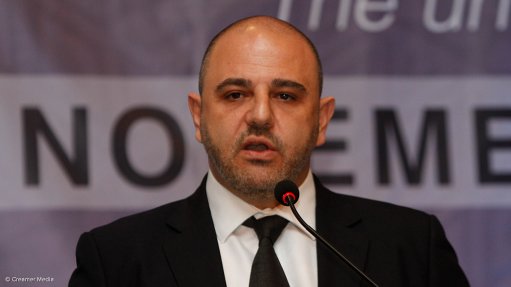
International Chromium Development Association president Phoevos Pouroulis
Photo by: Duane Daws
JOHANNESBURG (miningweekly.com) – Zimbabwe on Wednesday invited chrome mining investors to focus on underground chromium operations rather than cheaper strip mining operations, from which most of the country’s chromium ore is currently extracted.
In a keynote opening address to the packed thirty-third Chromium Conference, Zimbabwe’s Permanent Secretary of the Ministry of Mines and Mining Development Munesushe Munodawafa expressed the view that the future of chrome mining in the country lay in underground mining rather than the current opencast methods, which he described as being limited in both quantity and quality. (Also watch attached Creamer Media video).
“The future of chrome mining in Zimbabwe is in the developing of underground operations,” Munodawafa told the record number of 260 delegates from many parts of the world.
He urged investors in underground chrome-mining operations to consider partnerships with Zimbabwe’s small-scale miners.
“While we have moved on empowerment of the small-scale miners, we do appreciate – and it’s something we're looking at as a policy issue going forward – that small-scale miners may have limited capacity in terms of capitalisation - and now there are two things that we want to mention here. One is that we acknowledge that these small-scale miners may not be able to go into underground mining to a great extent, but also to indicate that they’re open to partnerships,” Munodawafa added at the conference attended by Creamer Media’s Mining Weekly Online.
He also highlighted a need for agglomeration technology for the processing of chromite fines and concentrates.
“We believe that without these interventions, the chrome sector may not give us as much value as we want,” he said.
Earlier, International Chromium Development Association (ICDA) president Phoevos Pouroulis, who is CEO of Tharisa Resources, the Johannesburg Stock Exchange-listed chrome/platinum co-producer, outlined the sustainability-promoting market analysis and benchmarking provided by the Paris-based ICDA, which was conceived in South Africa by South Africa’s ferrochrome industry in 1984.
Pouroulis announced that the ICDA was launching a China sub council to attract more membership from China, the world’s largest stainless steel producer and consumer of more than 50% of the world’s ferrochrome and stainless steel production.
Although South Africa and Zimbabwe hold the majority share of the world’s known chrome ore reserves, South Africa’s once dominant ferrochrome position has in recent years been lost to China.
In his address to the conference, Chamber of Mines of South Africa economist Henk Langenhoven made the point that the important contribution of mining to the South African economy has the potential to continue to provide significant ongoing value within the correct legislative framework.
“There’s still huge potential. It’s a case of unlocking it and incentivising it,” Langenhoven told the conference.
Earlier, he had outlined the negative impact that policy uncertainty and the latest mining charter are having on turning South Africa’s still huge mining endowment to positive account, but expressed the conviction that these impediments would be positively addressed.
“We’re very positive ourselves and confident that we’ll create something to unlock that potential,” Langenhoven added, on the eve of the chamber’s important 'continuing consequences' court case, better known as the ‘once empowered, always empowered’ issue, which is scheduled for tomorrow and Friday.
This hearing follows the step taken by South Africa’s Mineral Resources Ministry to avoid a court appearance on September 13, by extending its undertaking not to implement the controversial Mining Charter Three, pending an expedited hearing to review the charter’s content before a full bench in the Pretoria High Court on December 13 and 14.
But this is being preceded tomorrow and the next day by the application for a declaratory order on the question of 'continuing consequences'.